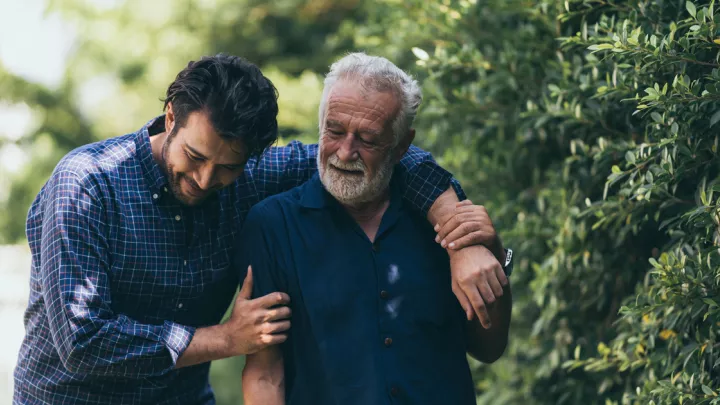How does owning a pet affect your health?

Pet ownership is more than just having a furry friend or scaly sidekick – it can significantly impact your health and well-being.
Numerous studies have shown that owning a pet offers a wide range of health benefits. However, dogs in particular, provide significant cardiovascular benefits, says Christina Dunbar Matos, DO, an advanced heart failure and transplant cardiologist.
“They require you to take them outside to walk, and that forces you to be more physically active,” she says. “We know that physical activity is a tremendous benefit and essential for heart health.”
Dog owners tend to live longer than nonowners and are less likely to die from a heart attack or stroke. They also recover more quickly from heart attacks and strokes, especially if they live alone.
This may not be surprising, considering daily walks or playtime with a pet can positively impact:
- Cholesterol
- Blood pressure
- Blood glucose levels
- Diabetes
- Weight
The ‘pet effect’
In addition to physical benefits, spending time with pets has been shown to improve mental health. The simple act of petting an animal has been shown to lower blood pressure, a phenomenon known as the “pet effect.”
“Even those who aren’t able to get outside and enjoy the benefits of regular, vigorous activity can have benefits from sitting on their couch and petting their cat, dog or whatever animal they may have,” Dr. Dunbar says.
Caring for an animal can also reduce feelings of loneliness and isolation in older adults, says geriatric psychiatrist Steven Wengel, MD.
“When you have a pet, they depend on you because that dog, cat, hamster or whatever it may be, is not going to survive if you don’t feed them,” he says. “It seems like a fundamental need to be needed and have those connections.”
Other studies have shown that owning a pet may slow cognitive decline in older adults who live alone.
Emotional support
Owning a pet can also help individuals recover from adverse events. Research has found that service animals can reduce symptoms of PTSD and improve social interactions.
It’s a dynamic Dr. Dunbar has seen firsthand. While volunteering at a rescue shelter in Virginia, she witnessed a profound moment between a very rambunctious dog and a combat veteran looking to adopt.
“This veteran had a prosthetic leg from a battle injury, and when we brought him to this particular dog’s cage, the dog stopped barking, sat down and got extremely calm,” she says. “He let the veteran put a leash on him and walked by his side, which he had never done with any of us, and they just bonded immediately.”
The man went on to adopt the dog, and they traveled the U.S. together, sending photos to the shelter from various locations. The perceptive animal became a beloved pet and provided emotional support to his owner, Dr. Dubar says.
Adopt a pet
For those interested in pet ownership, Dr. Dunbar encourages adopting an animal that needs a home. She became deeply involved in animal rescue 11 years ago after adopting a dog she found on the side of the road.
“It just changed my life,” Dr. Dunbar says. “People talk about how they had epiphanies in life. This dog, for some reason, was an epiphany for me.”
While she currently has four pets – two dogs and two cats – Dr. Dunbar’s life goal is to own a rescue farm and help as many animals as she can. She believes animals and humans alike benefit from pet adoption.
“I’m not trying to preach, but if you are looking to get a pet, it will do your heart good if you rescue one. It’s just an amazing thing.”







